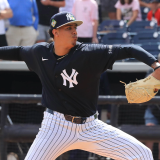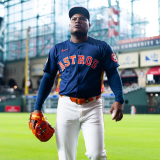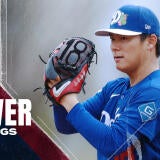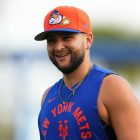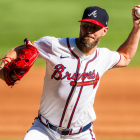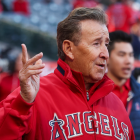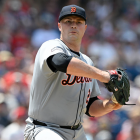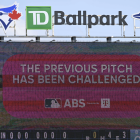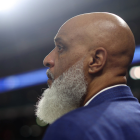Yankees vs. Dodgers: Ranking all 52 players in 2024 World Series, from middle relievers to superstars
New York and Los Angeles have, as you would expect, no shortage of stars in this Fall Classic
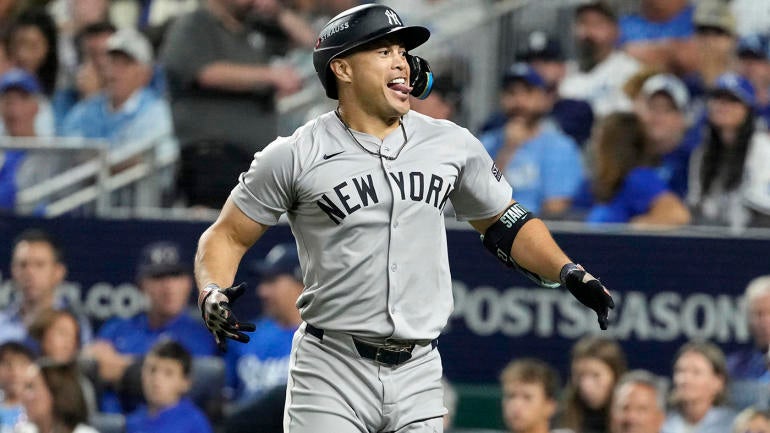
The New York Yankees and Los Angeles Dodgers will begin the 2024 World Series at Dodger Stadium tonight. This will mark the 12th time the two sides have met in a Fall Classic, making it the most common postseason matchup in Major League Baseball history. The Yankees have prevailed in eight of those first 11 meetings, albeit not the most recent matchup, which came back in 1981.
Before the Yankees and Dodgers take the field, we here at CBS Sports are previewing the World Series from myriad angles. That includes, among other exercises, paying homage to esteemed scribe Sam Miller by aping his old annual tradition of ranking all 52 players involved in the World Series.
For clarity: we're using the teams' respective LCS rosters with three exceptions, all based on how teams have talked about their rosters before releasing them. For the Yankees, Nestor Cortes, who has missed the postseason to date with injury, will replace fellow lefty Tim Mayza. For the Dodgers, they seem likely to welcome back shortstop Miguel Rojas and reliever Alex Vesia, who both got injured in the NLDS and missed the NLCS.
As with Miller's rankings, we're putting the players in order of how important we perceive them to be to their team's chances of winning the World Series. Unlike Miller, we've largely tiered the players, selecting one player to highlight per group before then giving the top 10 a more thorough breakdown.
Now, on to the reason you clicked.
Tier 1: Low-leverage kings
52. Brent Honeywell Jr., RHP, Dodgers
51. Trent Grisham, OF, Yankees
50. Oswaldo Cabrera, UTL, Yankees
49. Jasson Domínguez, OF, Yankees
48. Austin Barnes, C, Dodgers
47. Jose Trevino, C, Yankees
46. Marcus Stroman, RHP, Yankees
45. Landon Knack, RHP, Dodgers
44. Mark Leiter Jr., RHP, Yankees
43. Jake Cousins, RHP, Yankees
These 10 players are at the bottom for a simple reason: we don't expect them to play much. If they do appear more in the World Series than we expected, the odds are it'll come in low-leverage roles that limit their chances to make great contributions.
To illustrate the point, consider Honeywell's postseason. He's thrown 7 2/3 innings across two appearances in October. He entered both contests when the Dodgers trailed by six runs. Honeywell, then, isn't getting the call if the game is in doubt in either direction.
Tier 2: Situationally dependent
42. Jon Berti, INF, Yankees
41. Chris Taylor, 2B, Dodgers
40. Andy Pages, OF, Dodgers
39. Tim Hill, LHP, Yankees
38. Nestor Cortes, LHP, Yankees
37. Anthony Banda, LHP, Dodgers
36. Daniel Hudson, RHP, Dodgers
35. Ben Casparius, RHP, Dodgers
Here we have an assortment of relievers and role players. These individuals will certainly play a role in the proceedings, giving them a leg up on the players we listed in Tier 1. Simultaneously, their ability to impact this series is going to be based on factors beyond their control, preventing them from ranking higher on the list. Is it possible that one of the names listed above plays an outsize role in this series? Maybe a Jon Berti steals a crucial base, or a Ben Casparius hangs his star with a stellar outing. Absolutely, it's possible. It's just not something that you would anticipate in the run-up to Game 1.
Cortes is the wild card of the group. He hasn't pitched since mid-September on account of a flexor strain. It's to be seen how, precisely, manager Aaron Boone deploys him. We wouldn't bet against Cortes doing something notable, however -- especially after saying, in response to the possibility he makes his elbow ailment worse by returning to action this month: "if I have a ring and then a year off of baseball, then so be it."
Tier 3: One game can make a difference
34. Luis Gil, RHP, Yankees
33. Walker Buehler, RHP, Dodgers
32. Clarke Schmidt, RHP, Yankees
31. Ryan Brasier, RHP, Dodgers
We've reserved Tier 3 for the pitchers who will play an important role by starting a game during the middle of the series -- that includes Brasier, who has thus far served as the Dodgers' opener in two of their three bullpen games. A good start in Game 3 can have just as much value as a good start in Games 1 or 2. As such, there's no reason to sleep on their potential contributions toward a World Series victory.
We'll highlight Buehler by noting that his movement profile was different in his NLCS start against the Mets when compared to his NLDS start against the Padres. His four-seamer and cutter had more rise, and his sweeper had more horizontal break. Is that the result of some side session tweaking, or just a one-start glitch? We'll find out, but the Dodgers would greatly benefit from Buehler performing more like the NLCS version.
Tier 4: The regulars
30. Miguel Rojas, SS, Dodgers
29. Alex Verdugo, OF, Yankees
28. Austin Wells, C, Yankees
27. Gavin Lux, 2B, Dodgers
26. Enrique Hernández, UTL, Dodgers
25. Anthony Volpe, SS, Yankees
24. Max Muncy, 1B/3B, Dodgers
23. Teoscar Hernández, OF, Dodgers
22. Will Smith, C, Dodgers
21. Anthony Rizzo, 1B, Yankees
20. Jazz Chisholm Jr., 3B, Yankees
19. Tommy Edman, SS, Dodgers
18. Gleyber Torres, 2B, Yankees
With a few notable exceptions, these are the players who will be in the lineup every game, taking the bulk of the plate appearances. There's a real chance that someone within this tier ends up playing the hero. Since 2010 alone, the World Series Most Valuable Player Award has been bestowed upon the likes of Jorge Soler, Steve Pearce, and David Freese. It's not always the superstars delivering the biggest hits.
Torres, Muncy, Edman, and E. Hernández have each played the hero for their teams this month. If we had to pick another player from this tier who could emerge during the World Series, we would go with Chisholm. He's too talented and too capable of contributing, either with an extra-base hit or a stolen base, to be shut out from some personal glory all postseason long.
Tier 5: High-leverage workers
17. Alex Vesia, LHP, Dodgers
16. Michael Kopech, RHP, Dodgers
15. Tommy Kahnle, RHP, Yankees
14. Brusdar Graterol, RHP, Dodgers
13. Clay Holmes, RHP, Yankees
12. Blake Treinen, RHP, Dodgers
11. Luke Weaver, RHP, Yankees
Tier 5 consists of all the high-leverage relievers. We went back and forth on whether to put this group above Tier 4. In the end, we rationalized it this way: we expect this to be a tight series, and so the performance of any particular endgame reliever could end up swinging the contest. To put it another way, the regular positional players will have more opportunities to swing each game, but these pitchers could have more room for deviation (in either direction) during any particular outing.
One of our favorite postseason stats this year: Treinen has more saves in the playoffs (three) than he did during the entire regular season (1). He's been excellent for the Dodgers across six outings, surrendering one run and striking out 11 of the 33 batters he's faced in eight innings of work.
Now, let's rank the 10 players we consider to be the most important in the World Series.
Tier 6: The stars
10. Freddie Freeman, 1B, Dodgers
Freeman has had a miserable postseason to date (.219/.242/.219), entering an ill-timed slump that aligns perfectly with the sprained ankle he suffered at the end of the regular season. The time off between the NLCS and the World Series presumably helped him heal, but it seems unlikely that he's going to be anywhere close to 100%. (Remember: he described this as a four-to-six week injury; he's just now at the four-week mark.) We placed Freeman at the bottom of the top 10 because the Dodgers have shown a willingness to park him this postseason, suggesting they might do the same in the World Series.
9. Giancarlo Stanton, DH, Yankees
We've already seen evidence this month of how crucial a hot-hitting Stanton is to the Yankees lineup. He won the ALCS MVP after launching four home runs and driving in seven runs against the Guardians. Stanton's unlikely to match those contributions again here in the World Series, but it's critical for the Yankees to have him -- or whoever bats in the fourth or fifth spot in the order -- convert whenever they step to the plate with a runner (or two) in scoring position.
8. Carlos Rodón, LHP, Yankees
7. Jack Flaherty, RHP, Dodgers
We're pairing Rodón and Flaherty because we think that they occupy a similar space narratively. They're both veteran starters who will appear early in the series (Game 1 for Flaherty, presumably Game 2 for Rodón) and who have weathered recent ups and downs. Neither will be the best starting pitcher in their respective game, meaning that either throwing a gem could help their team "steal one," so to speak.
6. Yoshinobu Yamamoto, RHP, Dodgers
Without asking Andrew Friedman directly, we feel confident stating that the Dodgers pictured Yamamoto making many important starts for them over the years when they inked him to a $325 million pact last winter before he'd thrown a single MLB pitch. As weird as it sounds given the preceding sentence, it feels like Yamamoto's brilliance across his 18 starts went unnoted. He posted a 129 ERA+ and a 4.77 strikeout-to-walk ratio. Those are very good marks, especially for someone getting acclimated to a new country, a new league, a new team, and a new ball. Yamamoto should get the ball in Games 2 and 6 -- he has a chance to again vindicate the Dodgers' investment.
5. Gerrit Cole, RHP, Yankees
Last fall, Cole won his first career Cy Young Award. This fall, he has a chance to win his first World Series ring. We suppose it's only natural for a 34-year-old pitcher to be at the stage of his career where he's filling in the negative space. Cole, of course, missed a large swath of the season; when he returned, he wasn't at the peak of his powers (though he was still good). We consider him to be the most important pitcher in the series all the same because his Game 1 performance is going to shape how everything else plays out for the Yankees.
4. Mookie Betts, OF, Dodgers
Betts has turned his postseason around after some early woes that extended a rough stretch of playoff performances. He delivered (and some) against the Mets, hitting .346/.452/.731 with two home runs and nine runs batted in. Maybe it's because of the addition of Ohtani, or maybe it's because Betts missed an extended stretch because of injury; whatever the case, don't get it twisted: Betts remains one of the best players in the sport, and one of the keys to another Dodgers championship victory.
3. Juan Soto, OF, Yankees
Do you think Soto lives a charmed baseball life or what? He's on a Hall of Fame trajectory as a 25-year-old; he's about to hit free agency and make serious bank; and, on top of that, he has a chance to secure his second World Series ring. The Yankees' gambit to pair Soto with another one of the game's best hitters, in Judge, has absolutely paid off. This just so happens a series where Soto might not be the most brilliant player on the field. Take note, that's not often the case.
2. Shohei Ohtani, DH, Dodgers
Obviously, Ohtani was going to be first or second on this list; this is where the best players go, and you can make a convincing case that Ohtani is the best player in the league -- and, perhaps, in all of history. (For posterity's sake: if he was pitching, he would be No. 1 without question.) How could he not be in the top two anyway? He's the odds-on favorite to win the National League MVP Award, and he's in the midst of a (very good) first postseason run that has seen him hit for a .934 OPS to date.
1. Aaron Judge, OF, Yankees
Why Judge over Ohtani? It's simple: unless Ohtani makes an unexpected pitching appearance (and we stress that don't think that possibility is on the table), Judge will be the only one of the two with the potential to impact the game in a defensive manner. As great as Ohtani was during the regular season, Judge was also the superior hitter by a wide margin, according to Baseball-Reference's OPS+ measure. Put those factors together and we think that's enough justification for placing Judge atop the list.




